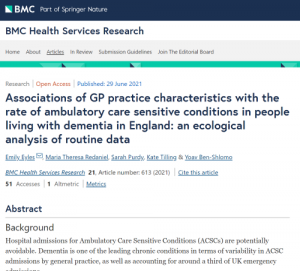Avoidable hospital admissions in people living with dementia
As the population ages, the number of people living with dementia is increasing. People with dementia are more likely to go to hospital and to do worse once they’re there.
Many different interventions exist which aim to avoid people with dementia being taken into hospital. It is possible that factors relating to care in GP practices may influence whether people with dementia go to hospital.
Project aims
We wanted to understand what GP practice factors make it more likely that someone with dementia will be admitted to hospital, and what can be done to reduce that risk.
The project had two parts:
- a ‘systematic review’ of all the scientific trials that looked at interventions to reduce hospital admissions in people with dementia
- to model the characteristics of GP practices and how they related to people with dementia going to hospital, either for an avoidable reason, or an unavoidable one
What we did
The systematic review
We looked at studies up to October 2018 of different interventions which aimed to reduce hospital admissions in people with dementia.
The interventions we looked at were:
- care management, which involves a nurse or community worker co-ordinating care of dementia patients
- counselling or self-help, providing support groups, coaching and reminiscence therapy
- specialised services – services where GPs had received enhanced training, or memory clinics
- physiotherapy or occupational therapy
We looked at whether the interventions reduced the risk of people with dementia being admitted to hospital, the length they stayed in hospital, and mortality rate.
Modelling GP practice characteristics
Using information up to March 2018, we modelled hospital admissions from GP practices of people with dementia.
The factors we looked at were:
- Basic practice characteristics, such as how many female patients there were, and the number of patients seen by the practice
- Quality of care in the practice, measured by patient ratings and a quality score taken by the NHS
- Geographic characteristics: the region a practice is located in, and whether it’s in a rural area
- Mental health budget: how much of the local area budget is spent on mental health
We looked at which factors could avoidable and unavoidable hospital admissions for people with dementia, and also how much this varied by GP practice and NHS area.
What we found and what this means
In the systematic review, we found no evidence that the targeted interventions reduced the likelihood of hospital stay or mortality rate for people with dementia.
Some evidence suggested that care management interventions, physiotherapy or occupational therapy, and specialised services were associated with small reductions in length of hospital stay, but this evidence was very weak.
There was no evidence to suggest that counselling or self-help interventions had any effect on length of hospital stay.
In the modelling study, we found that the GP practice factors predicted both avoidable and unavoidable admission almost equally, but that GP practices varied greatly in terms of admissions.
The mental health budget impacted admissions differently: for avoidable admissions, a larger mental health budget showed a decrease in those with dementia going to hospital, and the opposite was true for unavoidable ones.
This means that improving the mental health budget could help prevent avoidable visits to hospital for people with dementia.
What next?
The systematic review shows that none of the trialled interventions reduced either the rate that people with dementia were taken into hospital, the length of hospital stay or risk of death.
More research should be undertaken on the differences we found between the NHS areas, particularly relating to the mental health budget. Examining what differences exist within practices could help improve care and reduce avoidable visits to hospital.
Further research is needed into reducing hospital admissions in people with dementia, to improve outcomes and quality of life.
Papers

Can non-pharmacological interventions reduce hospital admissions in people with dementia? A systematic review
Read the paper
Associations of GP practice characteristics with the rate of ambulatory care sensitive conditions in people living with dementia in England: an ecological analysis of routine data
Read the paperLead collaborators
- Dr Penny Whiting, University of Bristol

